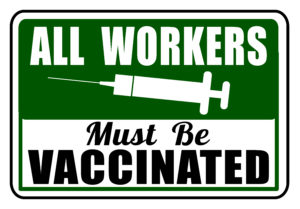
DOUBLE JEOPARDY!
OSHA & CMS Vaccine Mandates
What is “something new every week”?
For months, there have been legal battles surrounding federal vaccine mandates. On January 13th, the U.S. Supreme Court finally weighed in on two mandates with wide implications for employers.
OSHA Vaccine-or-Test Mandate
In a 6-3 decision, the Supreme Court ruled to reinstate a block on OSHA’s Vax-or-Test emergency temporary standard (ETS). This standard would have required businesses with 100 or more employees to have their workforce (80+ million people nationwide) either fully vaccinated against COVID or regularly tested for COVID and masked. The Court’s reasoning was that OSHA, the administration tasked with ensuring safe workplace conditions, had created a standard which was too far reaching. OSHA’s standard, according to the Supreme Court’s opinion, attempted to address “a threat that is untethered, in any casual sense, from the workplace.”
For a moment, it seemed that OSHA’s ETS was headed back to the 6th Circuit Court of Appeals for review. That was the case until January 26th, when OSHA withdrew the emergency temporary standard, in favor of pursuing a permanent standard.
It is unclear exactly what a permanent standard form OSHA would look like, but it is expected to be more targeted. The Supreme Court noted that OSHA would have more luck regulating businesses that operate in “crowded or cramped environments.” OSHA will certainly keep this in mind as they go into the formal rulemaking process.
CMS Vaccine Mandate
In a 5-4 decision, the Supreme Court upheld a healthcare worker vaccine mandate from CMS. The rule requires healthcare facilities that receive Medicare and Medicaid reimbursements to have ALL workers (including volunteers and students) at facilities fully vaccinated. As with other COVID mandates, workers are exempt from this requirement for religious (Title VII) or medical (ADA) reasons.
The countdown now begins for healthcare facilities to hit the two-phase vaccine benchmarks. Due to legal challenges from certain states, there are discrepancies in deadlines between states.
24 states (including FL, NJ, NY, & PA):
- Phase 1: First vaccine dose by Jan. 27, 2022
- Phase 2: Fully vaccinated by Feb. 28, 2022
25 states:
- Phase 1: First vaccine dose by Feb. 14, 2022
- Phase 2: Fully vaccinated by March 15, 2022
- Astute readers will notice that 24+25 does not equal the 50 states in our great nation. Texas filed a separate lawsuit which was dismissed on January 21st, so they’re on their own timeline:
- Phase 1: First vaccine dose by Feb. 22, 2022
- Phase 2: Fully vaccinated by March 21, 2022
For more on the CMS mandate, see their FAQ.
StraightforWARD Legal Advice:
OSHA: Although some of the rulemaking process was completed when OSHA created the temporary standard, this handy dandy flowchart makes clear that the permanent standard will not be developed overnight. This gives employers a bit of breathing room before having to enforce a possible vaccine mandate.
CMS: While medical facilities should be doing all they can to hit vaccination benchmarks, CMS has given a bit of wiggle room for non-compliance. Medical facilities can avoid monetary penalties (but will still be cited) if they meet the following:
- Phase 1: More than 80% compliance, with a plan to reach 100% compliance within 60 days
- Phase 2: More than 90% compliance, with a plan to reach 100% compliance within 30 days
The Supreme Court’s rulings may be substantial, but federal mandates aren’t the only requirements for employers to consider. There are also a litany of state and local measures that employers need to consider, including some which conflict with federal mandates.
For assistance navigating federal, state and local COVID mandates, employers should contact Jennifer Ward at 215-647-6601 or jward@thewardlaw.com.
